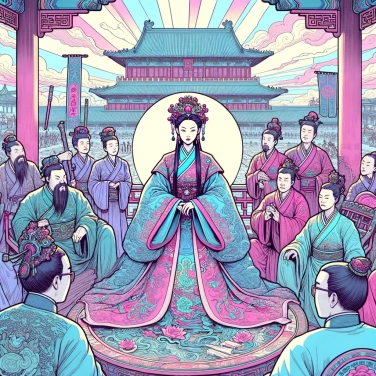Empress Cixi wielded significant political influence in China due to her position as regent for most of the Qing dynasty, making important political decisions and influencing state affairs, despite the restrictive social norms of the time.

The imperial China of the 19th century is going through a complicated period: internal troubles, external pressures, and the Qing dynasty in serious difficulty. Within the country, peasant revolts, corruption, and a struggling economy seriously weaken imperial power. Outside, the West manifests quite aggressively, forcing the country to open up to international trade after the Opium wars against Great Britain. These conflicts also lead to so-called "unequal" treaties, humiliating for China, which loses its sovereignty over several strategic territories and ports. In short, the country must juggle forced modernization, millennia-old traditions, and a general feeling of humiliation in the face of foreign colonial powers. It is in this highly tense context that the remarkable figure of an exceptional woman, Cixi, will emerge.
Originally a simple concubine of modest rank at the imperial court, Cixi succeeded in climbing the ranks after giving birth to the only male heir of Emperor Xianfeng. Upon his death in 1861, she joined a palace alliance, orchestrated a discreet coup, and became co-regent on behalf of her young son, Emperor Tongzhi. With extraordinary skill in political intrigue, she subsequently eliminated her rivals and quickly established herself as the true mistress of imperial power. Cixi maintained her influence through clever strategies, surrounding herself with close allies and loyal eunuchs to reinforce her authority at court. Her exceptional journey reflects how she was both a feared and respected figure at the head of the Chinese empire.
Arriving in power unofficially, Cixi exerts significant influence from behind the scenes, placing trusted men in key positions. She launches the Self-Strengthening Movement in the 1860s-1890s to attempt to modernize China: a Western-style army, railways, light industry, arsenals, scientific and military schools. Pragmatic, she remains attached to traditions but understands the importance of adopting certain ideas from abroad. Her reign is also marked by a particular political game, not always very clear, between strict conservatism and a measured desire for modernization. Despite her efforts, most reforms remain superficial or hindered by the resistance of the conservative imperial court. In the final years, the empress cautiously supports more radical reforms like the Hundred Days of Reform before abruptly changing her mind and cracking down on reformers deemed too bold.
Faced with increasing foreign pressures, Empress Cixi often adopts an ambivalent stance, torn between resistance and compromise. During confrontations such as the Sino-Japanese War of 1894-1895 or the anti-foreign Boxer Rebellion in 1900, she initially supports a hardline approach, even encouraging the Boxer movement that aimed to expel foreigners from China. However, when Western troops land in Beijing, she quickly changes her strategy, opts for a tactical retreat, and accepts the conditions imposed by the great powers, ultimately signing the Boxer Protocol in 1901. This forces China to pay astronomical indemnities and accept even more foreign presence on its territory. This mix of initial resistance followed by forced pragmatism becomes emblematic of the complex foreign policy pursued by Cixi: sometimes bold but often constrained by an unfavorable balance of power.
Cixi's decisions have largely shaped the fate of the Qing dynasty and left traces up to today in China. Through her refusal of overly radical reforms and her partial maintenance of ancient traditions, she slowed down Chinese modernization. But paradoxically, it was also during her reign that the first efforts toward a certain modernity emerged, with the establishment of the first Western-style schools and the sending of Chinese students to study abroad. Due to a resistance to rapid political change, she indirectly contributed to the fall of the empire and the emergence of revolutionary ideas leading to republican China in the early 20th century. Even today, she symbolizes a pivotal era when China hesitated between tradition and modernity. Many see her as one of the most controversial yet also one of the most decisive figures in modern Chinese history.
Cixi began her imperial life as a low-ranking concubine before becoming one of the most powerful and influential women in Chinese history, thus illustrating a rare social ascent.
Little-known fact: Empress Cixi was passionate about photography and was one of the first Chinese sovereigns to agree to pose in front of a Western camera.
Under the informal rule of Cixi, China experienced both attempts at modernization and hesitations towards Westernization, as illustrated by her complex attitude towards the "Hundred Days of Reform" in 1898.
Although often accused of wasting public funds, Cixi also encouraged the development of modern infrastructure such as railways and telegraphs in China.
For a long time, Cixi has been portrayed as tyrannical and ultra-conservative in both Western and Chinese historical accounts. Today, a growing number of historians are re-examining her legacy, moderating her decisions and highlighting, for example, her gradual openness to socio-economic reforms, her willingness to stabilize the situation, and even a certain political pragmatism in the face of difficult circumstances.
His legacy remains a subject of debate: some historians highlight his cautious yet genuine efforts at late administrative and military modernization, while others point to his conservatism and strategic mistakes that may have hastened the decline of the Qing dynasty. He remains a controversial historical figure, both a symbol of cultural resistance to Western imperialism and a representation of the internal weaknesses at the end of the Chinese imperial era.
Cixi played a crucial role in decision-making on issues such as military and economic modernization, international relations, and the management of internal uprisings. Despite some controversies surrounding her choices, she was a key figure in the face of the significant foreign and internal pressures that Imperial China was experiencing at the time.
Her indirect reign was marked by decisions deemed conservative or contradictory. She is particularly criticized for her opposition to the modernist reforms of the Hundred Days in 1898 and for her indirect support of the Boxer Rebellion in 1900, choices that had dramatic consequences for China's sovereignty in relation to Western powers.
If Empress Cixi initially sought to protect Chinese traditions and imperial sovereignty, she nevertheless had to face various humiliations imposed by the unequal treaties with Western powers. Her reign was marked by the constant struggle to contain colonial expansion and the growing foreign influence in China.
The Dowager Empress Cixi (1835-1908) was a concubine who rose to the status of regent and dowager empress, thus exerting a major influence on the Qing Empire for nearly half a century. She indirectly ruled the state, profoundly influencing Chinese political and institutional affairs from the late 19th century to the early 20th century.

No one has answered this quiz yet, be the first!' :-)
Question 1/6